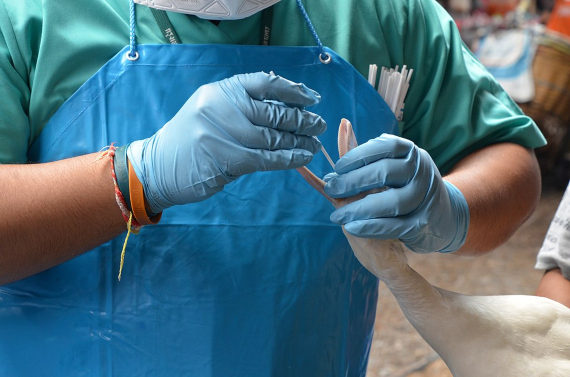Throughout the COVID-19 pandemic, we have heard many people say they were shocked by what they thought was a fictional dystopian scenario that they never imagined in reality. This was despite the fact that the scientific community had been sounding the alarm for years about the risk of a serious pandemic. In this disconnect between science and the public, the role of governments should not be forgotten, since, as has become clear, countries—at least in the West—were not prepared to deal with a global epidemic. As a result, apart from the very rapid advent of vaccines and diagnostic tests—a brilliant triumph of modern science—the means that have been most widely relied on to curb contagion were already in use one or more centuries ago, such as masks, quarantines and lockdowns. Now the question is: will we do better in the next pandemic?
A new study, as yet unpublished, has found several coronaviruses closely related to SARS-CoV-2 in bats in China’s Yunnan province, including the second most similar one that we know of, with 94.5% similarity between the two genomes, second only to the 96% similarity of another virus discovered in 2013 called RaTG13. But earlier research has already identified several thousand coronaviruses in bats. These potential enemies are joined by a list of human pathogens identified by the World Health Organisation (WHO) as the most worrying, along with the ever-present threat of new strains of influenza and the growing danger of resistant bacteria, which many voices, including the WHO, point to as the possible protagonists of the next great pandemic.
International warning systems and reinforcement of the health systems
As such, after COVID-19, it will be hard for anyone to believe that pandemics are just the stuff of science fiction. So to start with, international warning systems may need to be revamped. The WHO saw how countries barely responded to the 30 January 2020 declaration of a Public Health Emergency of International Concern (PHEIC), the highest official level of alert, and only began to react in March when the unofficial designation of pandemic began to be discussed. A possible reform of the alert system or even an international treaty on pandemics are options now on the table at the WHO and could be discussed at the body’s general assembly in May.
But even if the leading international health organisation effectively implements the lessons learned from this pandemic, this does not guarantee that countries will respond adequately. Indeed, in many cases, the WHO’s initial recommendations, such as avoiding border closures, were ignored. According to a recent editorial in Nature Medicine, “more than anything else, the COVID-19 crisis has been a failure of governance.” “No amount of research and scientific development can compensate for ineffective leadership and a lack of coordination within governments and international cooperation between countries,” it adds.

As former WHO Director-General Margaret Chan writes in the same journal, better preparedness must also include strengthening countries’ health systems to ensure universal coverage and a level of health in the population that reduces inequalities and co-morbidities that can increase the mortality of a pandemic.
Another aspect that experts insist on in the face of future pandemics is, in Chan’s words, “to build trust.” The COVID-19 crisis has shown how conspiracy theories, anti-vaccine discourse and the spread of misinformation and hoaxes can undermine even an adequate response. “Building trust involves responsible leadership, empowering communities, engaging with civil society and encouraging health literacy,” writes the former WHO director-general.
Anticipatory epidemiological approaches
In contrast to politics, science has undoubtedly responded quickly, collectively and interdisciplinarily against the pandemic, despite some initial stumbles such as the delay in extending the recommendation of wearing face masks or in identifying risks such as aerosols or asymptomatic transmission, along with dubious information based on myriad studies that reached the media before their obligatory peer review. But the rapid development of diagnostics, the tracking and tracing systems, the testing of potential treatments and the development of vaccines have played a key role in the reactive response to COVID-19.

However, experts suggest that science must also be proactive in preventing future pandemics, through anticipatory epidemiological approaches—known as nowcasting—and by maintaining the surveillance and monitoring of potential new zoonoses within the One Health vision, which integrates human health, animal health and environmental conservation. Nor is the field of therapeutics limited only to reacting to an already declared epidemic; according to University of North Carolina epidemiologists Rita Meganck and Ralph Baric, research should be directed towards the development of broad-spectrum antivirals and drugs to strengthen the body’s own fight against pathogens or to quell hyperimmune syndromes, including the repurposing of drugs already approved or currently in trials.
The same applies to vaccines. The existence of standardised platforms, based for example on adenoviruses or messenger RNA, has allowed their rapid adaptation to COVID-19. At Stanford University, bioengineer James Swartz is working on the creation of vaccine precursors, ready-made bioparticles in large quantities, ready to be loaded with the antigen of a new virus and thus create tailor-made vaccines very quickly.
The design of broad-spectrum vaccines
But it might not even be necessary to wait for a new virus to emerge to obtain the relevant antigen; in the journal Nature, immunologists Dennis Burton and Eric Topol of the Scripps Institute point to the need for governments to fund the design of broad-spectrum vaccines. According to the two experts, the properties of the COVID-19 virus have facilitated vaccine development because of the presence of a clear and accessible molecular target, the Spike or S protein, but this is not true in other cases; the most obvious examples of this are HIV, a very tough nut to crack for vaccinology, and new variants of influenza that escape the vaccines already available.
Burton and Topol suggest a rational design based on so-called broadly neutralising antibodies, which act against parts common to different strains or variants and even to several related viruses, and which currently hold promise against HIV, for which no immune-like weapon yet exists. “Such antibodies could be used as first-line drugs to prevent or treat viruses in a given family, including new lineages or strains that have not yet emerged,” they write. “More importantly, they could be used to design vaccines against many members of a given family of viruses.”

Finally, writes virologist John Nkengasong, director of the Africa Centres for Disease Control and Prevention, in Nature Medicine, it is also crucial to enhance the role of digital technologies, especially Artificial Intelligence, which “with its analytical power, will be a major asset in detecting patterns in the spread of pathogens or potential treatments.”
In short, the experts insist that if we want to learn the lessons that will prevent future disasters like the current one, the time is now. According to Chan, “those who fail to learn from past pandemics are doomed to repeat them.”
Comments on this publication